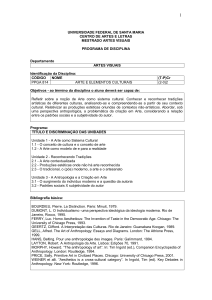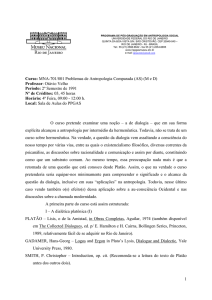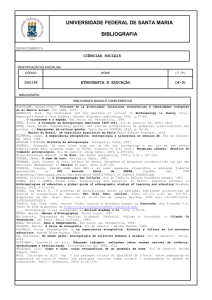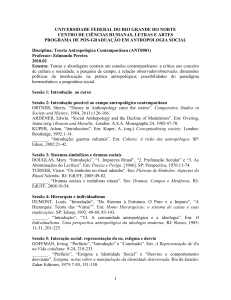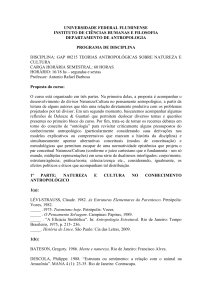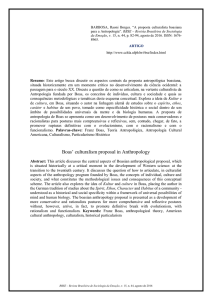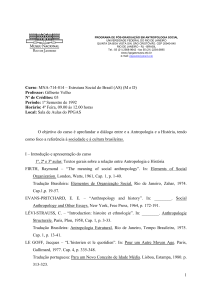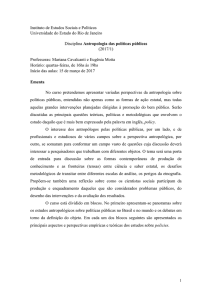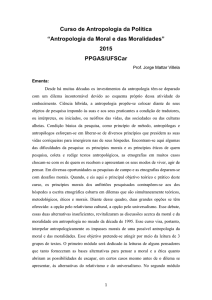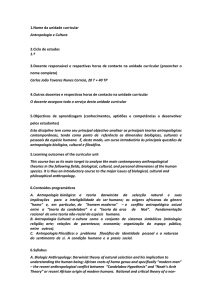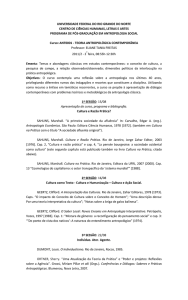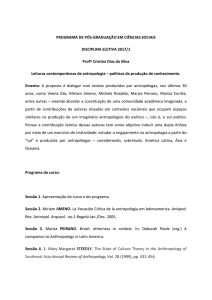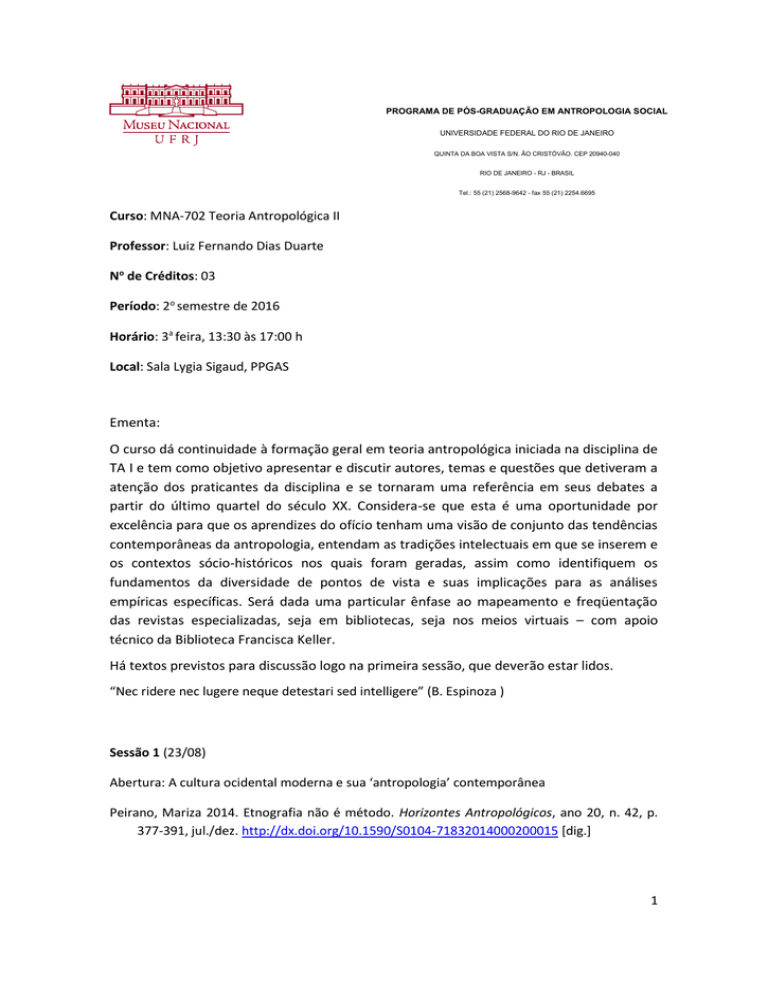
PROGRAMA DE PÓS-GRADUAÇÃO EM ANTROPOLOGIA SOCIAL
UNIVERSIDADE FEDERAL DO RIO DE JANEIRO
QUINTA DA BOA VISTA S/N. ÃO CRISTÓVÃO. CEP 20940-040
RIO DE JANEIRO - RJ - BRASIL
Tel.: 55 (21) 2568-9642 - fax 55 (21) 2254.6695
Curso: MNA-702 Teoria Antropológica II
www://ppgasmuseu.etc.br
e-mail: [email protected] /
Professor: Luiz Fernando Dias Duarte
No de Créditos: 03
Período: 2o semestre de 2016
Horário: 3a feira, 13:30 às 17:00 h
Local: Sala Lygia Sigaud, PPGAS
Ementa:
O curso dá continuidade à formação geral em teoria antropológica iniciada na disciplina de
TA I e tem como objetivo apresentar e discutir autores, temas e questões que detiveram a
atenção dos praticantes da disciplina e se tornaram uma referência em seus debates a
partir do último quartel do século XX. Considera-se que esta é uma oportunidade por
excelência para que os aprendizes do ofício tenham uma visão de conjunto das tendências
contemporâneas da antropologia, entendam as tradições intelectuais em que se inserem e
os contextos sócio-históricos nos quais foram geradas, assim como identifiquem os
fundamentos da diversidade de pontos de vista e suas implicações para as análises
empíricas específicas. Será dada uma particular ênfase ao mapeamento e freqüentação
das revistas especializadas, seja em bibliotecas, seja nos meios virtuais – com apoio
técnico da Biblioteca Francisca Keller.
Há textos previstos para discussão logo na primeira sessão, que deverão estar lidos.
“Nec ridere nec lugere neque detestari sed intelligere” (B. Espinoza )
Sessão 1 (23/08)
Abertura: A cultura ocidental moderna e sua ‘antropologia’ contemporânea
Peirano, Mariza 2014. Etnografia não é método. Horizontes Antropológicos, ano 20, n. 42, p.
377-391, jul./dez. http://dx.doi.org/10.1590/S0104-71832014000200015 [dig.]
1
Jensen, Casper B. 2016. New Ontologies? Reflections on Some Recent ‘Turns’ in STS,
Anthropology
and
Philosophy.
Osaka
University.
https://www.academia.edu/25710614/New_Ontologies_Reflections_on_Some_Recent_T
urns_in_STS_Anthropology_and_Philosophy
Sessão de treinamento no acesso aos recursos de pesquisa da Biblioteca F. S. V. Keller
Sessão 2 (30/08)
Ortner, Sherry B. 1984. Theory in Anthropology since the Sixties. Comparative Studies in
Society and History 26 (1): 126-66. / “Teoria na Antropologia desde os Anos 60”. Mana.
Estudos de Antropologia Social 17 (2): 419-466.
Kuper, Adam 1992. Introduction. In Kuper, Adam. Conceptualizing society. Londres: Routledge.
[pp. 1-14]
Kuper, Adam 1999. Cultura, a visão dos antropólogos. Bauru: EDUSC, 2002 – [Introdução:
guerras culturais (pp. 21- 44); Cap. 7 (pp. 287- 311)].
Peirano, Mariza 2006. Onde está a antropologia ? In A teoria vivida e outros ensaios de
antropologia. Rio de Janeiro: Jorge Zahar Editor. [pp. 15-36]
Peirano, Mariza 1998. When Anthropology is at Home: The Different Contexts of a Single
Discipline. Annu. Rev. Anthropol. 27: 105-128.[dig.]
Sessão 3 (06/09)
Dumont, Louis 1983. Essais sur l’individualisme: une perspective anthropologique sur
l´idéologie moderne. Paris: Seuil. [caps.vi - La communauté anthropologique et
l´idéologie, e vii - La valeur chez les modernes et chez les autres. pp. 187-262]. [em
português – pp. 201-288]. / O Individualismo. Uma Perspectiva Antropológica da Ideologia
Moderna. Rio de Janeiro: Rocco, 2000
Dumont, Louis 1992 [1966]. Homo hierarchicus: le système des castes et ses implications. Paris:
Gallimard. [Introduction e Postface pour l´édition “Tel” : Vers une théorie de la hiérarchie.
pp. 13-35 e 396-403]. / Homo hierarchicus. São Paulo : EDUSP, 1997
Foucault, Michel 1977. Vigiar e Punir. O nascimento da prisão. Petrópolis: Vozes [1ª. Parte,
cap. 1 (pp.11-32); 3ª. Parte, Cap. 1 (125-152)]
Sessão 4 (13/09)
Leach, Edmund 1966. Virgin Birth. Proceedings of the Royal Anthropological Institute of Great
Britain and Ireland, Vol.0, issue 1966: 39-49. [dig.]
Douglas, Mary 1976 [1967]. Pureza e Perigo. São Paulo: Perspectiva. [Introdução; Caps. 1, 2, 6
(pp. 19-56; 117-140)].
2
Douglas, Mary 1982 [1978]. Passive voice theories in religious sociology. In the active voice.
Mary Douglas. Londres: RKP [pp. 1-15]
DaMatta, Roberto 1979. Augusto Matraga e a hora da renúncia. In Carnavais, Malandros e
Heróis. Para uma sociologia do dilema brasileiro. Rio de Janeiro, Zahar Editores. [dig.]
Sessão 5 (20/09)
Goffman, Erving 1975. Estigma. Rio: Zahar.[pp. 11-50].
Goffman, Erving 1981. Forms of Talk. University of Pennsylvania Press.
Becker, Howard S. 1974. Labelling theory reconsidered. Deviance and social control. Rock &
McIntosh, Tavistock. [pp. 41-66]
Becker, Howard S. 1977. Mundos artísticos e tipos sociais. Arte e sociedade. Gilberto Velho
(org.). Rio: Zahar. [pp. 09-25]
Sessão 6 (04/10)
Berger, Peter 1978. The problem of multiple realities: Alfred Schutz and Robert Musil. In
Phenomenology and sociology, Luckman, Thomas (org.). Penguin Books. [pp.343-367]
Geertz, Clifford 1973. Thick Description: Toward an Interpretive Theory of Culture. In: The
Interpretation of Cultures. New York: Basic Books. [pp. 3-30]
Geertz, Clifford 1974. ‘From the Native’s Point of View’: on the Nature of Anthropological
Understanding. In: Local Knowledge. Further Essays in Interpretive Anthropology.New
York: Basic Books, 1983. [pp. 55-70]
Geertz, Clifford 1983. Blurred Genres: The Refiguration of Social Thought. In: Local Knowledge.
Further Essays in Interpretive Anthropology. New York: Basic Books, 1983. [pp. 19-35]
Geertz, Clifford 1984. Anti Anti-Relativism. American Anthropologist 86 (2): 263-278.
Sessão 7 (11/10)
Clifford, James 1986. On Ethnographic Allegory. In: James Clifford & George Marcus (orgs.).
Writing Culture. The Poetics and Politics of Ethnography. Berkeley: University of California
Press. [pp. 98-121] / “Sobre a Alegoria Etnográfica. In: A Experiência Etnográfica:
Antropologia e Literatura no Século XX: 63-99. Rio de Janeiro: EDUFRJ, 1998.
Marcus, George E. 1986. Contemporary Problems of Ethnography in the Modern World
System. In: James Clifford & George Marcus (orgs.). Writing Culture. The Poetics and
Politics of Ethnography. Berkeley: University of California Press. [pp. 165-193]
3
Marcus, George E. 1986. Afterword. Ethnographic Writing and Anthropological Careers. In:
James Clifford & George Marcus (orgs.). Writing Culture. The Poetics and Politics of
Ethnography. Berkeley: University of California Press. [pp. 262-266]
Rabinow, Paul 1986. Representations are Social Facts: Modernity and Post-Modernity in
Anthropology. In: James Clifford & George Marcus (orgs.). Writing Culture. The Poetics
and Politics of Ethnography. Berkeley: University of California Press. [pp. 234-261].
[1999. Antropologia da Razão. Rio de Janeiro: Relume Dumará. cap. 4]
Sessão 8 (18/10)
Sahlins, Marshall 1985. Islands of history. Chicago: Univ. of Chicago Press. [Caps 1, 2 e 5; pp. 172 e 136-156]
Sahlins, Marshall 1997. O "pessimismo sentimental" e a experiência etnográfica: por que a
cultura não é um "objeto" em via de extinção (parte I). Mana 3:41-74.[dig.]
Sahlins, Marshall 1997. O "Pessimismo Sentimental" e a Experiência Etnográfica: Por que a
Cultura não é um "Objeto" em Via de Extinção (parte II). Mana 3:103-150. [dig.]
Sessão 9 (25/10)
Bourdieu, Pierre 1980. Le sens pratique, Paris : Minuit. [Livro I, Cap. 1 ("Objectiver
l’objectivation"), pp. 51-70; cap. 3 ("Structures, habitus, pratiques"), pp. 87-109 ; cap. 6
("L'action du temps"), pp. 167-190]
Bourdieu, Pierre 1982. Ce que parler veut dire. L'économie des échanges linguistiques, Paris :
Fayard. [II. Langage et pouvoir symbolique. "Le langage autorisé. Notes sur les conditions
sociales de l'efficacité du discurs rituel", "Les rites d'institution". pp. 97-134]
Barth, Fredrik 1992. Towards greater naturalism in conceptualizing society. In Kuper, Adam
(org.) Conceptualizing society. London: Routledge. [pp. 17-33]
Barth, Fredrik 2000 [1989]. A análise da cultura nas sociedades complexas. In: O Guru, o
iniciador e outras variações antropológicas. Tomke, Lask (org.) Rio de Janeiro: Contracapa.
[pp. 107-119]
Sessão 10 (01/11)
Bateson, Gregory 1991. The birth of a matrix, or double bind and epistemology. In A sacred
unity: further steps to an ecology of mind, org. R. E. Donalson. New York: Cornelia &
Michael Bessie Books [pp. 191-213]
Wagner, Roy 1981 [1975]. The invention of Culture. Chicago: The University of Chicago Press.
168 p. [pp. xi-xx; 1-70]
Ingold, Tim (org.) 1996. General Introduction. Key Debates in Anthropology. Londres:
Routledge. [pp. 1-14][dig.]
4
Ingold, Tim 1996. Culture, Perception and Cognition. In: The Perception of the Environment:
Essays on Livelihood, Dwelling and Skill. Londres: Routledge. [pp. 157-171]
Sessão 11 (08/11)
Latour, Bruno 1992 [1991]. Jamais fomos modernos. Ensaio de antropologia simétrica. Rio de
Janeiro: Editora 34 [cap. 1, pp. 7-17, e cap. 5, pp. 129-143]
Latour, Bruno 2005. Reassembling the social: an introduction to actor-network-theory. Oxford:
Oxford University Press. [Part I: How to deploy controversies about the social world;
introduction, chapters 1-3. Part II: How to render associations traceable again;
introduction. Conclusion: From society to collective — can the social be reassembled? (pp.
23-96; pp. 159-164; pp. 247-262)].
Boltanski, Luc 1990. L’Amour et la Justice comme compétences. Trois essais de sociologie de
l’action. Paris: Metailié. [pp. 15-63]
Sessão 12 (22/11)
Strathern, Marilyn 1990. Out of context: the persuasive fictions of anthropology. In
Manganaro, Marc (org.) Modernist Anthropology: fieldwork to text. Princeton: Princeton
U. P. [pp. 80-122]
Strathern, Marilyn 1992. Parts and Wholes: Refiguring Relationship in a Post-Plural World. In:
A. Kuper (org.), Conceptualizing Society. London: Routledge. [pp. 75-104]
Strathern, Marilyn et al. 1996. The concept of society is theoretically obsolete. In: Ingold, Tim
(org.), Key Debates in Anthropology. New York: Routledge. [pp. 57-96] [dig.]
Strathern, Marilyn 1997. Entre uma melanesianista e uma feminista, Cadernos Pagu (8/9)
1997: pp. 7-49. [dig.]
Gell, Alfred 1998. Art and Agency: An Anthropological Theory. Oxford: Clarendon Press.
Sessão 13 (29/11)
Moore, Henrietta 1994. Understanding Sex and Gender. In Ingold, Tim (org.) Companion
Encyclopedia of Anthropology. Londres & New York: Routledge [dig.]
Butler, Judith 2003. Problemas de Gênero. Feminismo e subversão da identidade. Rio de
Janeiro: Civilização Brasileira [1º. Cap.]
Halberstam, Jackie 2005. In a Queer Time and Place. Transgender Bodies, Subcultural Lives.
New York University Press.
Fausto-Sterling, Anne 2001/02. Dualismos em duelo. Cadernos Pagu (17/18): pp. 9-79. [dig.]
5
Sessão 14 (06/13)
Asad, Talal 1973. Introduction. In: Talal Asad (org.), Anthropology and the Colonial Encounter.
New York: Humanities. [pp. 9-19]
Asad, Talal 1979. Anthropology and the Analysis of Ideology. Man 14 (4): 607-627. [dig.]
Appadurai, Arjun 1988. Putting Hierarchy in Its Place. Cultural Anthropology, 3 (1): 36-49. [dig.]
Abu-Lughod, Lila. 2000. Locating Ethnography. Ethnography, 1 (2):261-267. [dig.]
Comaroff, Jean e Comaroff, John. 2003. Ethnography on an Awkward Scale: Postcolonial
Anthropology and the Violence of Abstraction. Ethnography 4: 147-179. [dig.]
Gupta, Akhil & Ferguson, James 1997. Discipline and Practice: ‘The Field’ as Site,
Method, and Location in Anthropology. In Akhil Gupta e James Ferguson (orgs.)
Anthropological Locations: Boundaries and Grounds of a Field Science. Berkeley:
University of California Press. [pp. 1-46] [dig.]
Sessão 15 (13/12 )
Fabian, Johannes 1983. Time and the Other. How Anthropology Makes its Object. New
York: Columbia University Press [caps. 2, 3] [dig.]
Barth, Fredrik 1993. Balinese Worlds. The University of Chicago Press. [sumário, preâmbulo e
capítulo Mosaico Luminoso] [dig.]
Crapanzano, Victor 1980. Tuhami, portrait of a Moroccan. Chicago: Univ. of Chicago Press.
[prefácio, introdução e parte I]
6

